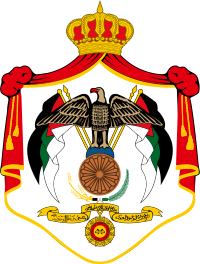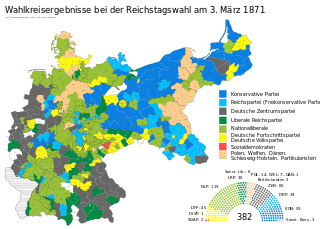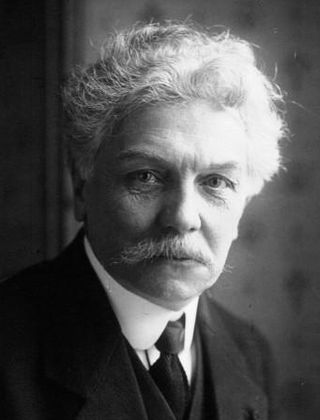 |
|---|
|
General elections were held in Jordan on 27 April 1967. [1] As political parties were banned at the time, all candidates ran as independents. [2] Voter turnout was 70.0%. [1]
 |
|---|
|
General elections were held in Jordan on 27 April 1967. [1] As political parties were banned at the time, all candidates ran as independents. [2] Voter turnout was 70.0%. [1]

The first federal elections were held in Germany on 3 March 1871. The National Liberal Party emerged as the largest party in the Reichstag, with 117 of the 382 seats. Voter turnout was just 51.0%.

Folketing elections were held in Denmark on 21 September 1920, except in the Faroe Islands, where they were held on 30 October. They were the first in which South Jutland County participated since the Schleswig Plebiscites and the return to Danish rule, and the total number of seats in the Folketing was increased from 140 to 149. The result was a victory for Venstre, which won 51 of the 149 seats. Voter turnout was 77.0% in Denmark proper and 56.2% in the Faroe Islands.

Folketing elections were held in Denmark on 2 December 1926, except in the Faroe Islands where they were held on 20 December. The Social Democratic Party remained the largest in the Folketing, with 53 of the 149 seats. Voter turnout was 77.0% in Denmark proper and 40.2% in the Faroes.

Parliamentary elections were held in Russia on 12 December 1993. They were the first parliamentary elections in post-Soviet Russia and the only time to the Federation Council, with future members appointed by provincial legislatures and governors.

Parliamentary elections were held in Ghana on 29 December 1992, the first since 1979. Voter turnout was just 28.1% amidst a boycott by opposition parties, who had claimed the preceding presidential elections in November – won by former military ruler Jerry Rawlings with 58% of the vote – were fraudulent, with international observers considering them not to have been conducted in a free and fair manner.

General elections were held in Belgium on 31 March 1968. The Christian Social Party remained the largest party. Voter turnout was 90.0%. Elections for the nine provincial councils were also held.

General elections were held in Belgium on 20 November 1921. The result was a victory for the Catholic Party, which won 70 of the 186 seats in the Chamber of Representatives. Voter turnout was 91.1% in the Chamber election and 91.0% in the Senate election.

General elections were held in Venezuela on 1 December 1963. The presidential elections were won by Raúl Leoni of the Democratic Action political party, who received 32.8% of the vote. Leoni's party won 66 of the 179 seats in the Chamber of Deputies and 22 of the 47 seats in the Senate. Voter turnout was 92.3% in the presidential election and 90.8% in the Congressional elections.

General elections were held in Puerto Rico on 5 November 1996. Pedro Rosselló of the New Progressive Party (PNP) was re-elected Governor, whilst the PNP also won a majority of seats in the House of Representatives and the Senate. Voter turnout was between 80% and 82%.

General elections were held in Jordan on 29 August 1951. As political parties were banned at the time, all candidates ran as independents, although some affiliated with the Jordanian Communist Party, the Ba'ath Party the Arab Constitutional Party and the Umma Party all won seats.

General elections were held in Lebanon between 27 August and 3 September 2000 to elect the 128 members of the Parliament of Lebanon. Independent candidates won the majority of seats, although most of them were considered members of various blocs. Voter turnout was 40.5%.

General elections were held in Puerto Rico on November 8, 1960. Luis Muñoz Marín of the Popular Democratic Party (PPD) was re-elected as governor, whilst the PPD's Antonio Fernós Isern was re-elected as Resident Commissioner. Voter turnout was 85%.

General elections were held in Puerto Rico on 3 November 1992. Pedro Rosselló of the New Progressive Party (PNP) was elected Governor, whilst the PNP also won a majority of seats in the House of Representatives and the Senate. Voter turnout was between 82% and 84%.
Dieter Nohlen is a German academic and political scientist. He currently holds the position of Emeritus Professor of Political Science in the Faculty of Economic and Social Sciences of the University of Heidelberg. An expert on electoral systems and political development, he has published several books.

General elections were held in Belgium on 26 May 1929. The result was a victory for the Catholic Party, which won 71 of the 187 seats in the Chamber of Representatives. Voter turnout was 94.0%.

Parliamentary elections were held in Brazil on 15 November 1978. The pro-government National Renewal Alliance Party (ARENA) won 231 of the 420 seats in the Chamber of Deputies and 15 of the 23 seats in the Senate. Voter turnout was 82%.
Presidential elections were held in Colombia on 10 February 1914. They were the first direct presidential elections since 1860. The result was a victory for José Vicente Concha of the Conservative Party, who received 89.1% of the vote. Vicente took office on 7 August.
Presidential elections were held in Colombia on 9 February 1930. The result was a victory for Enrique Olaya Herrera of the Liberal Party, who received 44.9% of the vote. He took office on 7 August.
Parliamentary elections were held in Colombia on 16 September 1951 to elect the Senate and Chamber of Representatives. Although the Liberal Party boycotted the elections, some Liberals from the Populares faction did stand. As a result of the boycott, the seats reserved for the minority party were left vacant, whilst the Conservative Party won the remainder.
Parliamentary elections were held in Colombia on 16 March 1958 to elect the Senate and Chamber of Representatives. They were the first elections held under the National Front agreement, which only allowed the Conservative Party and the Liberal Party to contest the elections, and allocated 50% of the seats in both houses to each party. As a result, the main contest at the elections was between factions within each party.